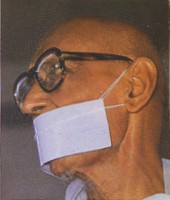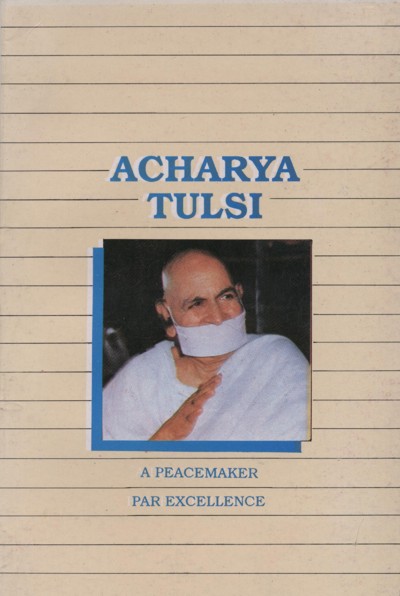In the course of his padyatra (travelling on foot) Acharyashree reached Bombay. Sarvodaya leader Jaiprakash Narayan was staying in Bomaby at that time. For an exchange of views a meeting was arranged between him and Acharyashree. The talks lasted for three days. Jaiprakash Narayan has recorded the impression his meeting with Acharyashree left on his mind in these words:
Both the Anuvrat and the Sarvodaya Movements are complementary. Almost all the leaders of this country and some leaders of the other countries have by now become familiar with the aim of this Movement. Acharya Tulsi has in fact set forth a magnificent ideal in order to march towards the accomplishment of our own ideal. Both Vinoba and Acharya Tulsi belong to all castes and all classes. Both of them desire the good of all. I was able to get a glimpse of Acharya Tulsi's lofty aims in the course of my discussion with him in Bombay. He is of the view that if all the violent forces of the world can join hands for destruction why can't the forces of nonviolence follow suit? The unity of the nonviolent forces in the world will surely pave the way for the fulfillment of the ultimate dream of ushering in a nonviolent society. Both the Movement for Sam-pati Dan (gifting away property) and the Anuvrat Movement cherish the common aspiration. One inspires, advises or even compels society to let its weaker sections share in its resources. The other lays emphasis on the renunciation of one's lust for acquisition. It doesn't call upon people to gift away what they have in excess but simply exhorts them to leave it for use by society. Anuvrat regards possession in all its forms as the root of sin. It is the main cause of violence. When there is a desire for acquisition, exploitation and violence are bound to follow as its natural corollaries.
Dr. Sampurnanand was a statesman. More than that he was a profound scholar. During Acharyashree's visit to Uttar Pradesh he stayed at his residence. It afforded him an opportunity to exchange views with him on many subjects. Later, when he was Governor of Rajasthan, he held long discussions with Acharyashree at Jaipur. He observed Acharyashree's life very closely. Hence he has portrayed it authoritatively in the following words:
Acharya Tulsi, the sponsor of the Anuvrat Movement, is far away from the sphere of politics. He has nthose who have more or less influenced the lives of millions. He is called Acharya since he is the head of a particular Jain sect. It is natural for anyone to expect that he should impart the knowledge of the basic canons of Jainism and those of his own sect to the disciples, monks and nuns of his order and yet no one has ever heard him or his followers say such things as may lacerate the feelings of others.
In the course of his barefoot marches, he visited thousands of villages, met millions of villagers and inspired many of them to relinquish addictions. What Acharyashree's marches have been able to achieve effortlessly in the field of moral uplift and character building is not possible even if crores of rupees are spent. One will be able to realize the truth of this statement just from a single incident.
Acharyashree was on his way to Nathvada village after his departure from Idava (district Nagaur). He halted briefly at Palyavas village. As usual, he delivered a discourse on the evils of addictions. Many people responded to his call to give up evil habits like smoking, alcoholism and meat eating. The Thakur of the village (the Rajput Chief of the village) also expressed a desire to renounce his addiction to drinking. Thereupon the villagers commented that his action would release half of them from this menace. One of the villagers who was sceptical of the Thakur's sincerity asked, Thakur Sahib, will it be possible for you to give up drinking?" The Thakur replied with unbistable firmness, "I have already given it up. If you ever see me touching it again you may chop my head off."
Addiction to drugs results in a vicious circle. It involves a large number of people. A man who takes opium, drinks or smokes a hookah or a chilam (a kind of tobacco pipe) persuades others to follow suit. In this way he creates a new generation of addicts. Thousands of people who came into contact with Acharyashree were able to free themselves from the use of intoxicants. Those who were not able to give them up were asked at least to refrain from persuading others to take them. Mr. Gopal Singh Shekhawat, General Secretary, Rajasthan University Students' Union, took the vow that he would neither have wine nor offer it to his guests.
Acharyashree’s padyatra is in fact a great march for the awakening of the people. Evaluating it President Gyani Zail Singh once remarked, "Acharya Tulsi is a Padyatri (a wayfarer or a traveller on foot). He is rendering a great service to the individual, society and nation by travelling round the country on foot. He does not seek any help from the Government. As a matter of fact he is helping the Government. Acharyashree does not need the Government but the Government needs him."
Underlying the miraculous personality of Acharya Tulsi is his own dedication. He attracts all small or big. His life too is varied. Sometimes he is in a mansion and sometimes in a hut. Sometimes he finds himself in the midst of scholars and sometimes in the midst of simple unassuming villagers. The women belonging to Katyayani village came for his darshan (paying obeisance to him). Acharyashree asked them what made them come so late.
One woman: We were going to our fields when you came.
Acharyashree: Did you take bhata (lunch) with you for your men on the farms?
Woman: Yes, Your Holiness.
Acharyashree: What do you have for lunch?
Women: Roti (Chapati), whey and rabari (maize cooked in whey).
Acharyashree: Do you not take'milk with you?
Womap: Milk is meant for children and not for elderly people.
Ac haryashree: Do you have lunch before you go to your field or do you go there without having it?
Woman: I have it before I go to my field. Some women think we must not eat before our husbands have done so but I do not subscribe to this view. My husband does not treat me well. He abuses me and sometimes whacks me also.
Acharyashree: It is not fair for a husband and a wife to pick a quarrel.
Woman: It is not fair, I agree, but what can one do? Peace in a family is not a one-way traffic.'
Acharyashree: Do you sell adulterated milk?
Woman: Yes, I do.
Acharyashree: Can you give up adulterating milk?
Woman: I will do it if you so desire.
Acharyashree's padyatra gives him ample opportunity of wide contact with the people, interesting talks with individuals, theoretical discussions, spiritual experiments and solutions of individual problems. What has been reproduced here is a mere glimpse of the pageant of Acharyashree's varied life. We have no knowledge of one such individual in the past as might have undertaken so extensive and endless a padyatra (barefoot journey). We do not think we shall have one in future.
Acharya Tulsi's first meeting with Vinoba Bhave took place at Rajghat (a sacred place where Gandhiji's cremation took place) Vinobaji said, "The shramans’ (Jain ascetics) tradition of padyatra dates from the ancient days. I have also adopted your way of living in my life." Acharyashree said, "It augurs well. At least we two have become padyatris. The people of India live in villages. Padyatra is a powerful medium for being in touch with them".
Vinobaji: How many miles do you walk a day?
Acharyashree: Ten to twelve miles.
Vinobaji: Approximately I also cover the same distance in a day.
Anuvrat and bhoodan yatra (Vinobaji's travelling on foot with the specific purpose of asking the people to gift away their excess land) once again revealed the significance
 Yuvacharya Mahaprajna
Yuvacharya Mahaprajna
